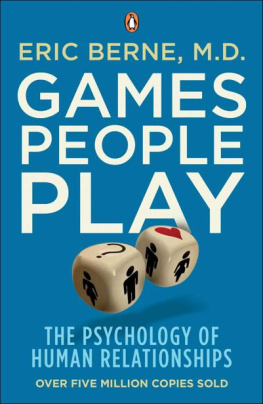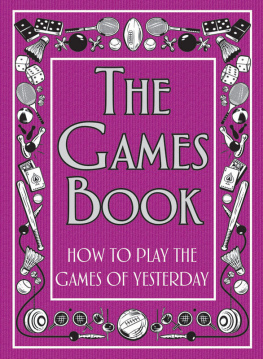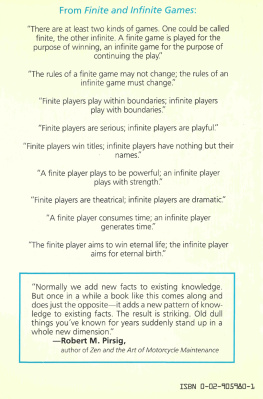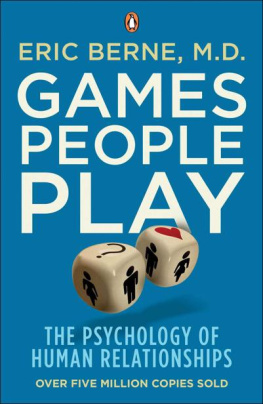PENGUIN BOOKS
GAMES PEOPLE PLAY
Dr Eric Berne, like his father, graduated from the Faculty of Medicine, McGill University, Montreal, Canada, and later moved to the United States, where he had his internship in psychiatry at the New Haven Hospital and the Yale Institute of Human Relations. He also studied at the New York and San Francisco Psychoanalytic Institutes. During the Second World War he served in the U.S. Army Medical Corps and was discharged with the rank of major. Afterwards he became a consultant in psychiatry and neurology to the Surgeon General of the U.S. Army. He was a practising psychiatrist in Carmel and San Francisco, California, a lecturer at the University of California Medical School, and Consultant in Group Therapy at McAuley Clinic in San Francisco. He was a corresponding member of the Indian Psychiatric Society, chairman of the board of trustees of the International Transactional Analysis Association and editor of the Transactional Analysis Bulletin. He also wrote The Mind in Action, Transactional Analysis in Psychotherapy, The Structure and Dynamics of Organizations and Groups and Principles of Group Treatment. A Laymans Guide to Psychiatry and Psychoanalysis and Sex in Human Loving are also available in Penguins. While at college he wrote for the Canadian magazine Forum, the London Adelphi, and other periodicals. He died in 1970.
ERIC BERNE
Games People Play
THE PSYCHOLOGY OF HUMAN RELATIONSHIPS

PENGUIN BOOKS
PENGUIN BOOKS
Published by the Penguin Group
Penguin Books Ltd, 80 Strand, London WC2R 0RL, England
Penguin Putnam Inc., 375 Hudson Street, New York, New York 10014, USA
Penguin Books Australia Ltd, 250 Camberwell Road, Camberwell, Victoria 3124, Australia
Penguin Books Canada Ltd, 10 Alcorn Avenue, Toronto, Ontario, Canada M4V 3B2
Penguin Books India (P) Ltd, 11 Community Centre, Panchsheel Park, New Delhi 110 017, India
Penguin Books (NZ) Ltd, Cnr Rosedale and Airborne Roads, Albany, Auckland, New Zealand
Penguin Books (South Africa) (Pty) Ltd, 24 Sturdee Avenue, Rosebank 2196, South Africa
Penguin Books Ltd, Registered Offices: 80 Strand, London WC2R 0RL, England
www.penguin.com
First published in the USA 1964
Published in Great Britain by Andr Deutsch 1966
Published in Penguin Books for sale outside the United Kingdom 1967
Published in Penguin Books for sale within the United Kingdom 1968
Copyright Eric Berne, 1964
All rights reserved
Except in the United States of America, this book is sold subject to the condition that it shall not, by way of trade or otherwise, be lent, re-sold, hired out, or otherwise circulated without the publishers prior consent in any form of binding or cover other than that in which it is published and without a similar condition including this condition being imposed on the subsequent purchaser
ISBN: 978-0-14-193836-3
To my patients and students who taught me more and more and are still teaching me about games and the meaning of life
Contents
Preface
T HIS book is primarily designed to be a sequel to my book Transactional Analysis in Psychotherapy , contains new clinical and theoretical material which, added to the old, makes it possible to understand to some extent what it means to be game-free. Those desiring further background are referred to the earlier volume. The reader of both will note that in addition to the theoretical advances, there have been some minor changes in terminology and viewpoint based on further thinking and reading and new clinical material.
The need for this book was indicated by interested requests from students and lecture audiences for lists of games, or for further elaboration of games mentioned briefly as examples in a general exposition of the principles of transactional analysis. Thanks are due in general to these students and audiences, and especially to the many patients who exposed to view, spotted or named new games; and in particular to Miss Barbara Rosenfeld for her many ideas about the art and meaning of listening; and to Mr Melvin Boyce, Mr Joseph Concannon, Dr Franklin Ernst, Dr Kenneth Everts, Dr Gordon Gritter, Mrs Frances Matson, and Dr Ray Poindexter, among others, for their independent discovery or confirmation of the significance of many games.
Mr Claude Steiner, formerly Research Director of the San Francisco Social Psychiatry Seminars and presently in the Department of Psychology at the University of Michigan deserves special mention on two counts. He conducted the first experiments which confirmed many of the theoretical points at issue here, and as a result of these experiments he helped considerably in clarifying the nature of autonomy and of intimacy. Thanks are also due to Miss Viola Litt, the Secretary-Treasurer of the Seminars, and to Mrs Mary N. Williams, my personal secretary, for their continued help, and to Anne Garrett for her assistance in reading the proof.
SEMANTICS
For conciseness, the games are described primarily from the male point of view unless they are clearly feminine. Thus the chief player is usually designated as he, but without prejudice, since the same situation, unless otherwise indicated, could as easily be outlined with she, mutatis mutandis. If the womans role differs significantly from the mans, it is treated separately. The therapist is similarly without prejudice designated as he. The vocabulary and viewpoint are primarily oriented toward the practising clinician, but members of other professions may find this book interesting or useful.
Transactional game analysis should be clearly distinguished from its growing sister science of mathematical game analysis, although a few of the terms used in the text, such as payoff, are now respectably mathematical. For a detailed review of the mathematical theory of games see Games & Decisions, by R. D. Luce and H. Raiffa.
Carmel, California, May 1962
REFERENCES
Berne, E., Transactional Analysis in Psychotherapy , Evergreen, 1961.
Luce, R. D., and Raiffa, H., Games & Decisions, Chapman & Hall, 1957.
Introduction
1 SOCIAL INTERCOURSE
T HE theory of social intercourse, which has been outlined at some length in Transactional Analysis, may be summarized as follows.
Spitz has found that infants deprived of handling over a long period will tend at length to sink into an irreversible decline and are prone to succumb eventually to intercurrent disease. In effect, this means that what he calls emotional deprivation can have a fatal outcome. These observations give rise to the idea of stimulus-hunger, and indicate that the most favoured forms of stimuli are those provided by physical intimacy, a conclusion not hard to accept on the basis of everyday experience.
An allied phenomenon is seen in grown-ups subjected to sensory deprivation. Experimentally, such deprivation may call forth a transient psychosis, or at least give rise to temporary mental disturbances; In the past, social and sensory deprivation is noted to have had similar effects in individuals condemned to long periods of solitary imprisonment. Indeed, solitary confinement is one of the punishments most dreaded even by prisoners hardened to physical brutality,
On the biological side, it is probable that emotional and sensory deprivation tends to bring about or encourage organic changes. If the reticular activating system of the brain stem is not sufficiently stimulated, degenerative changes in the nerve cells may follow, at least indirectly. This may be a secondary effect due to poor nutrition, but the poor nutrition itself may be a product of apathy, as in infants suffering from marasmus. Hence a biological chain may be postulated leading from emotional and sensory deprivation through apathy to degenerative changes and death. In this sense, stimulus-hunger has the same relationship to survival of the human organism as food-hunger.












